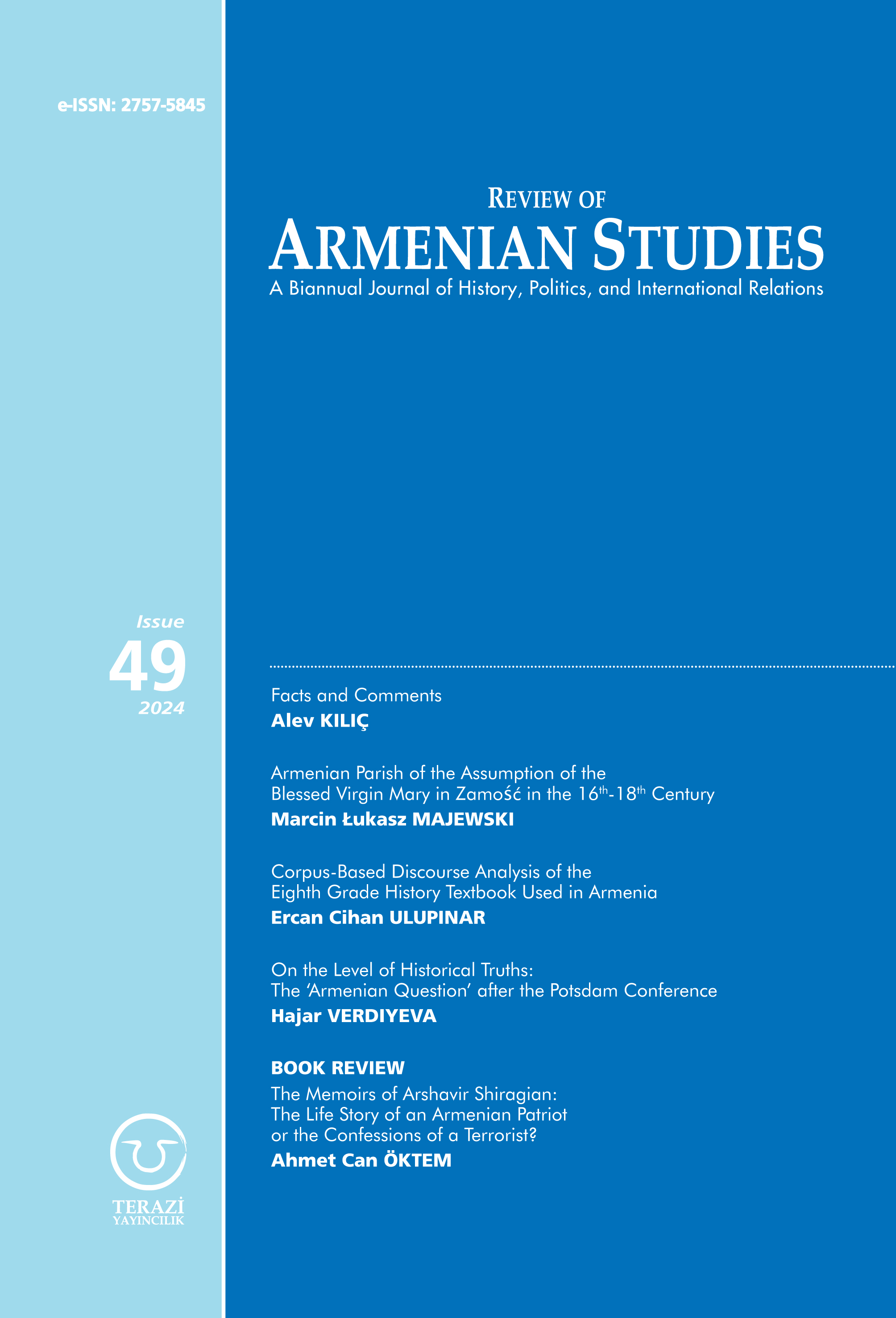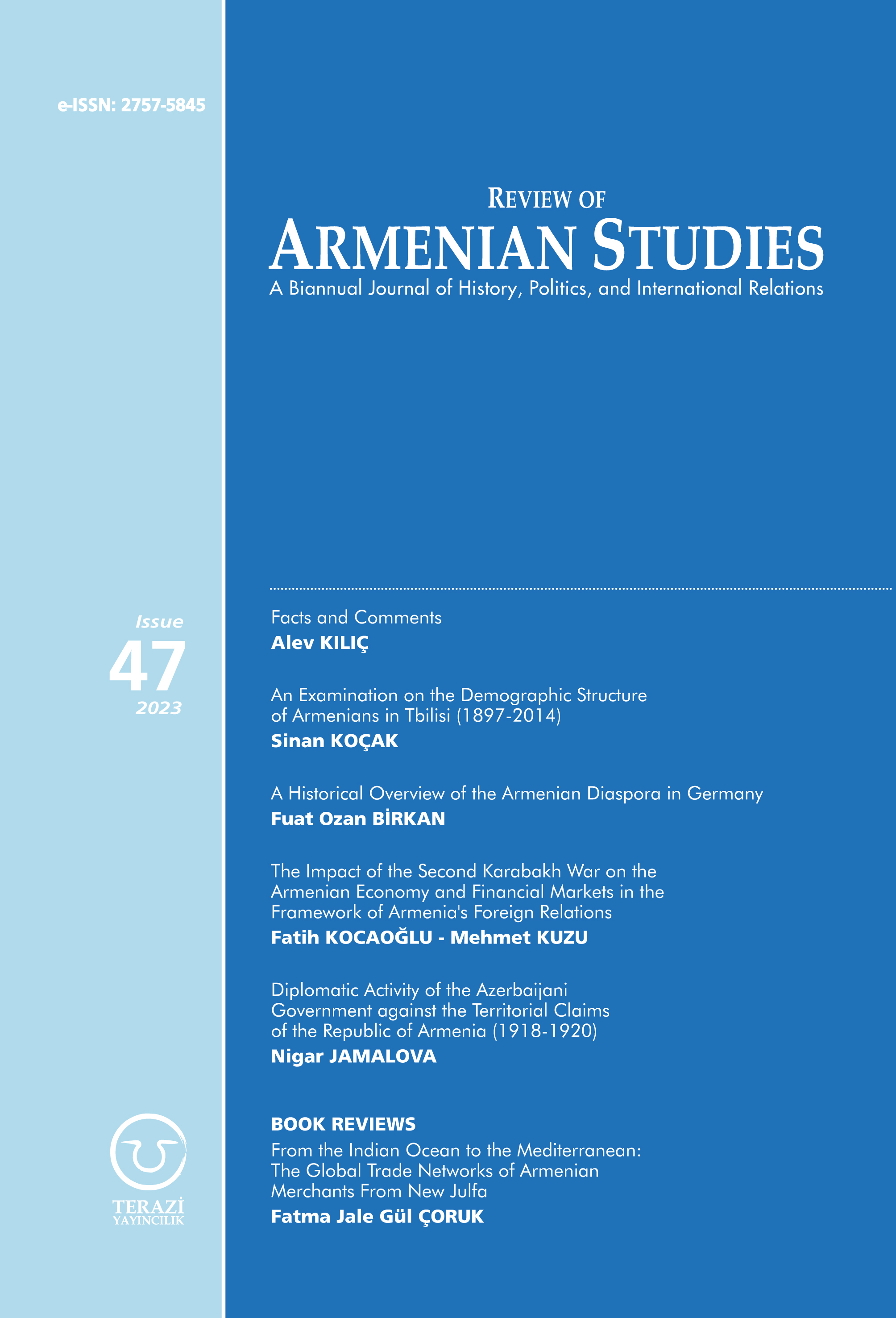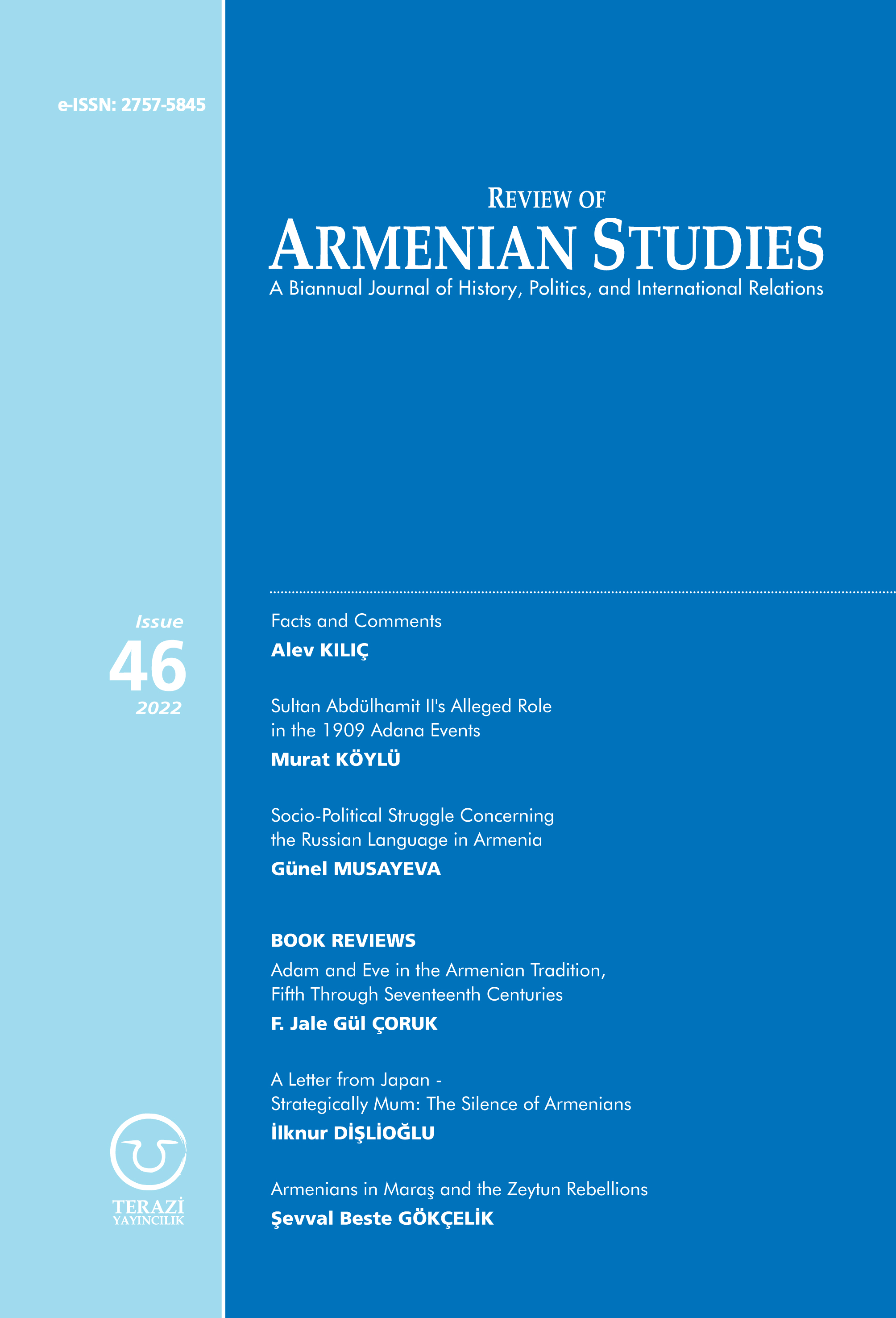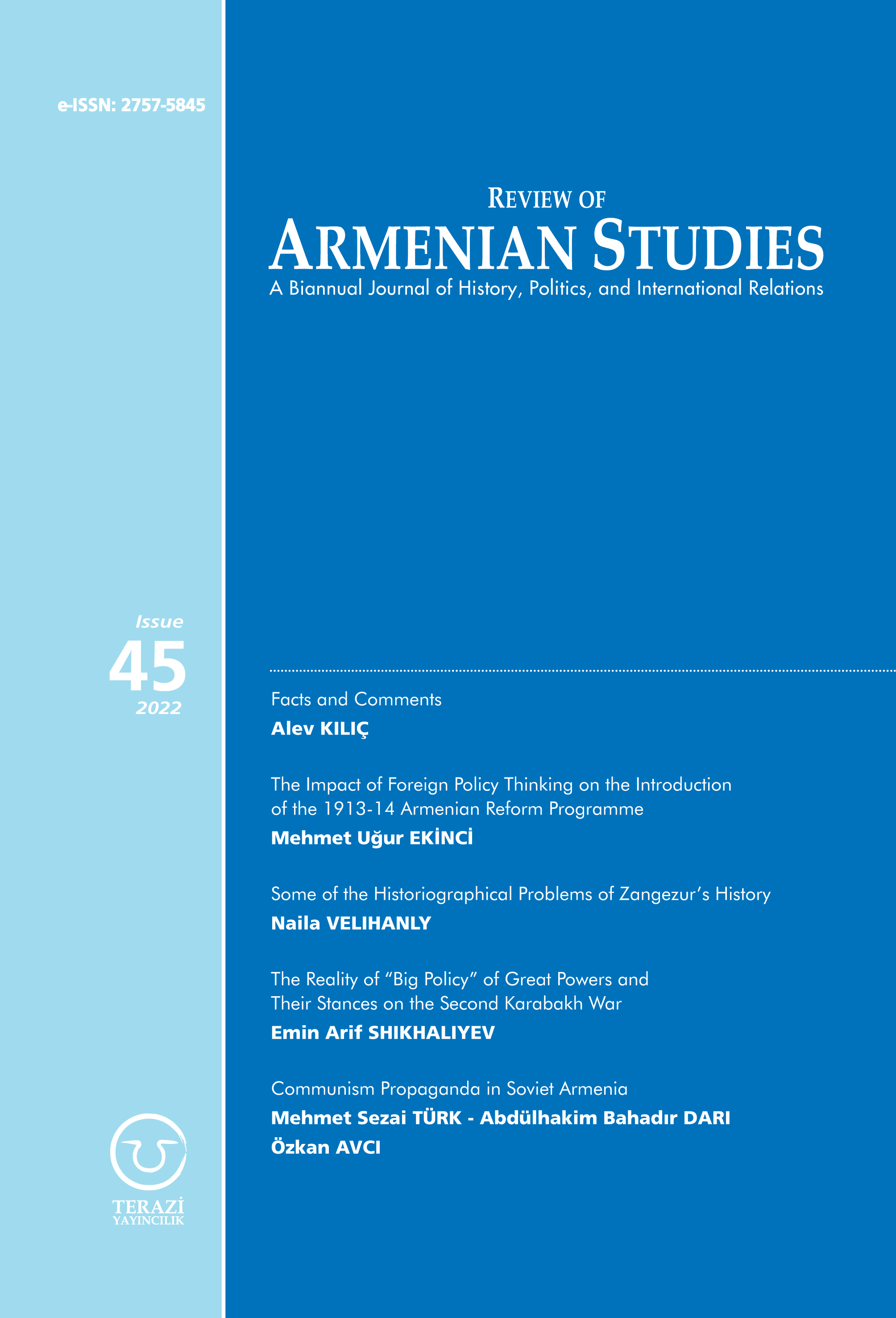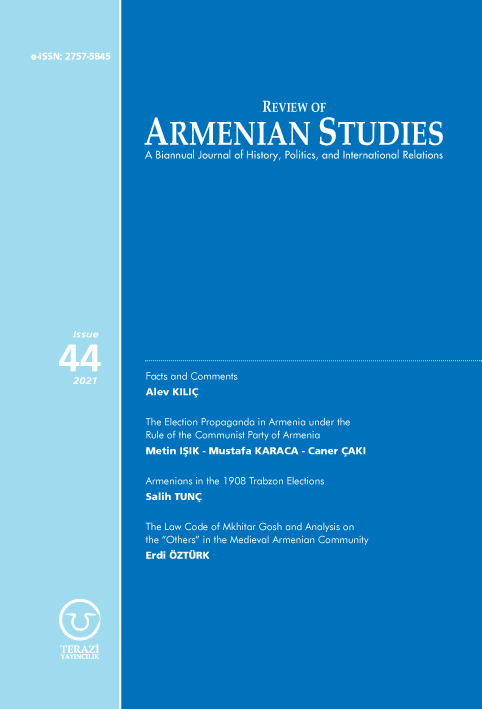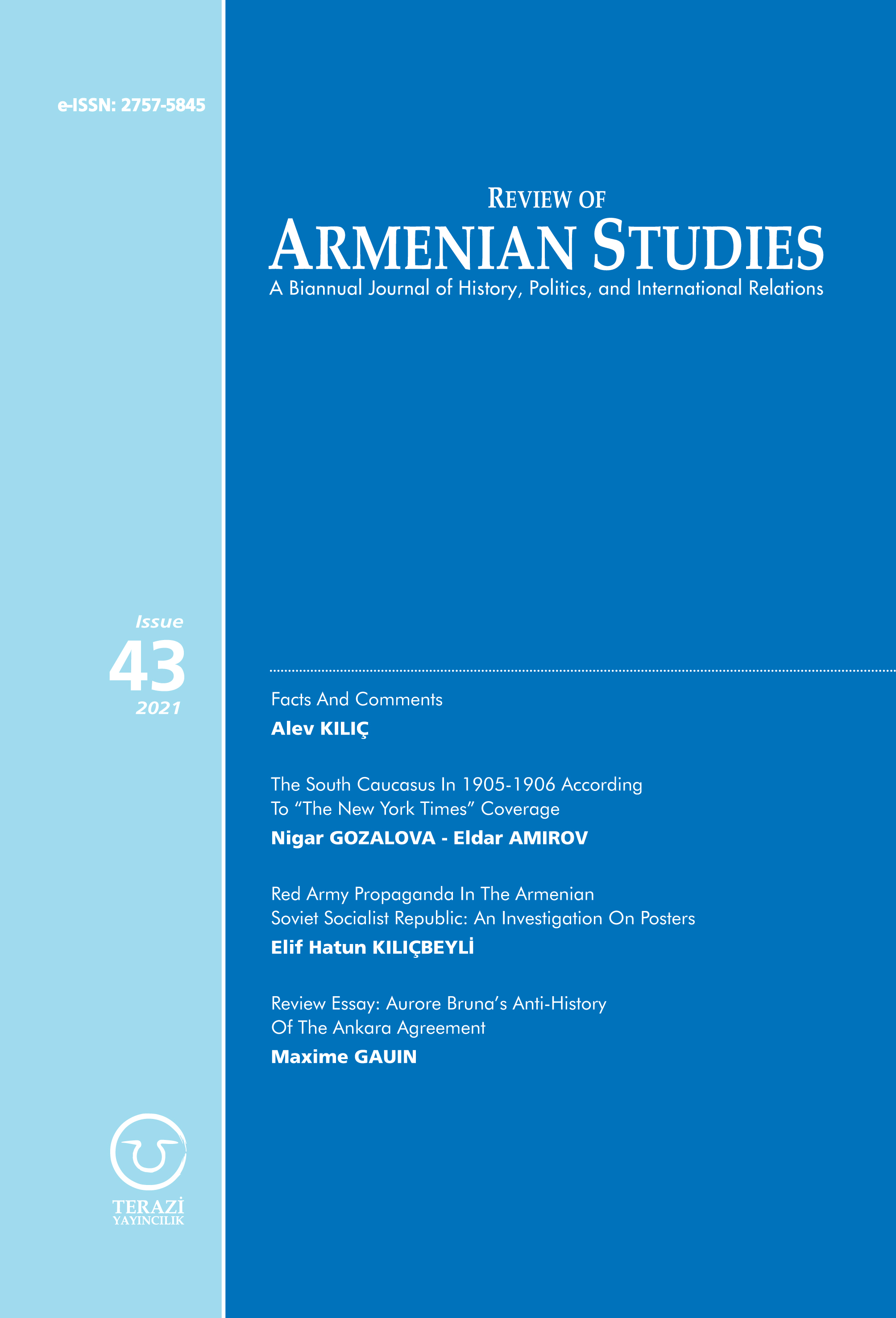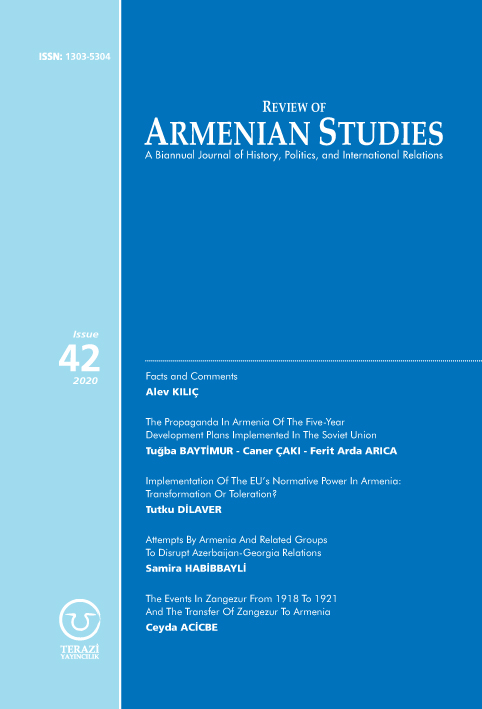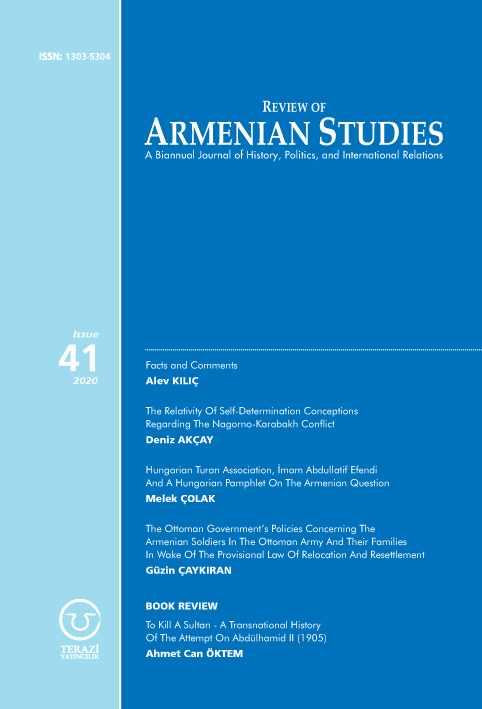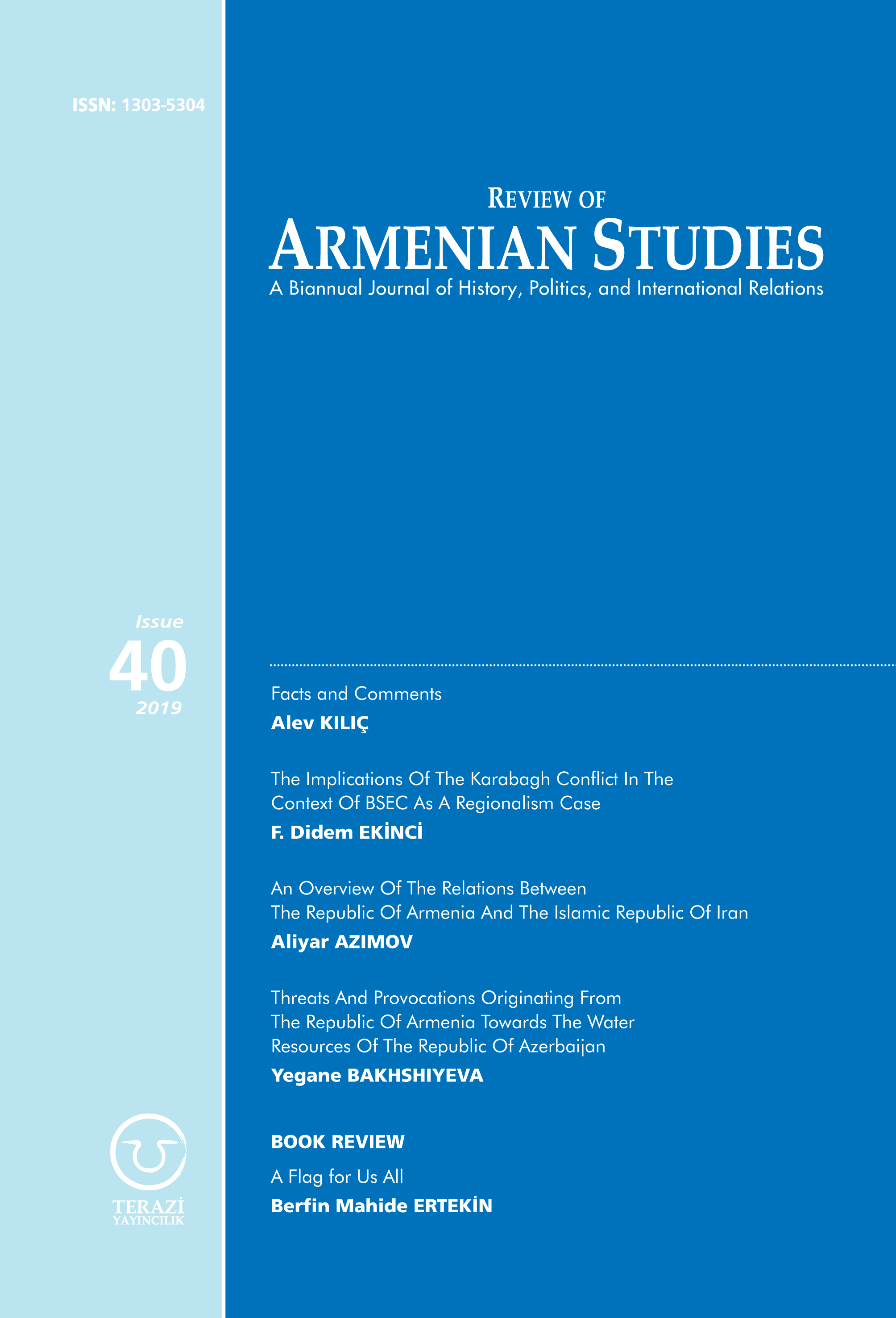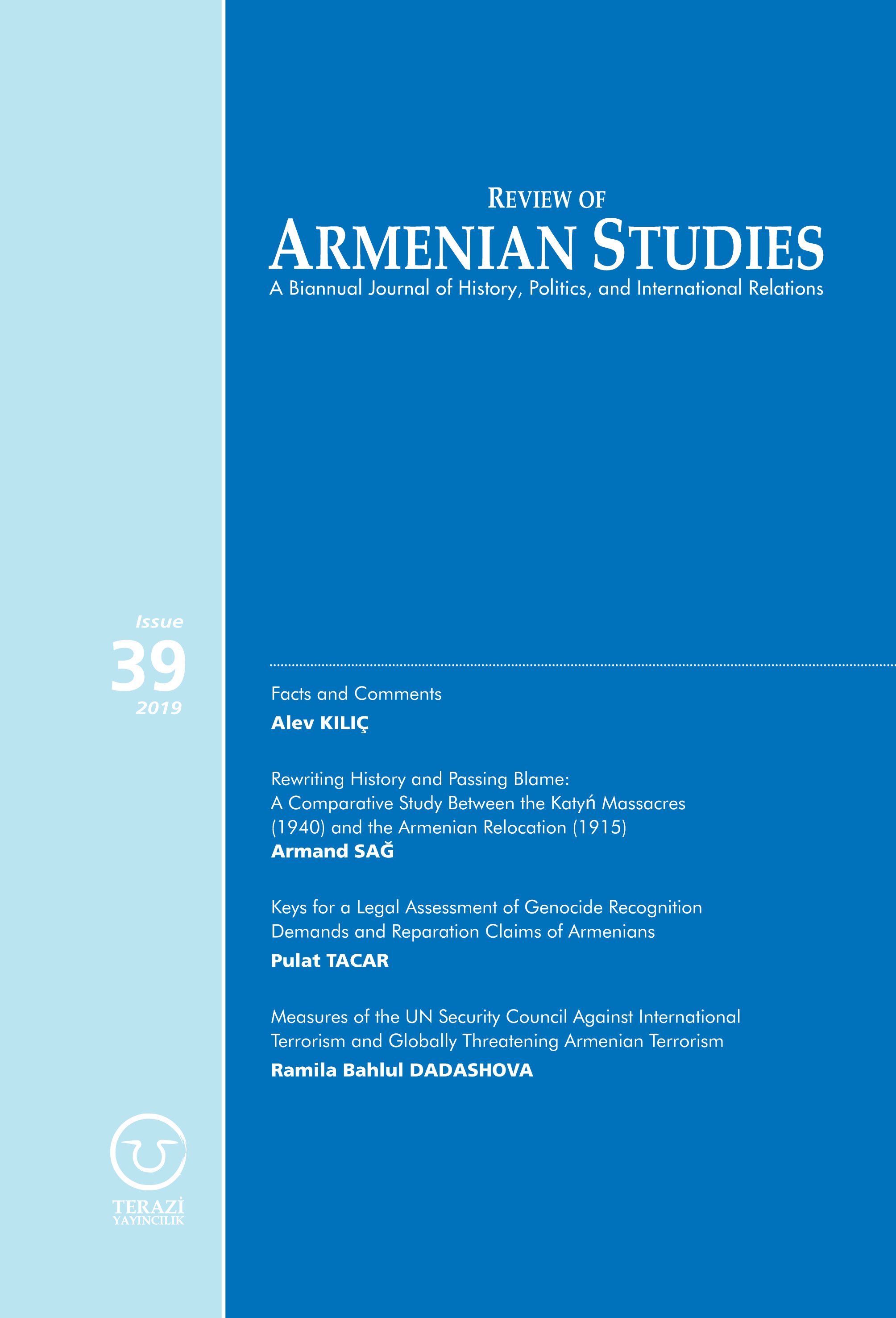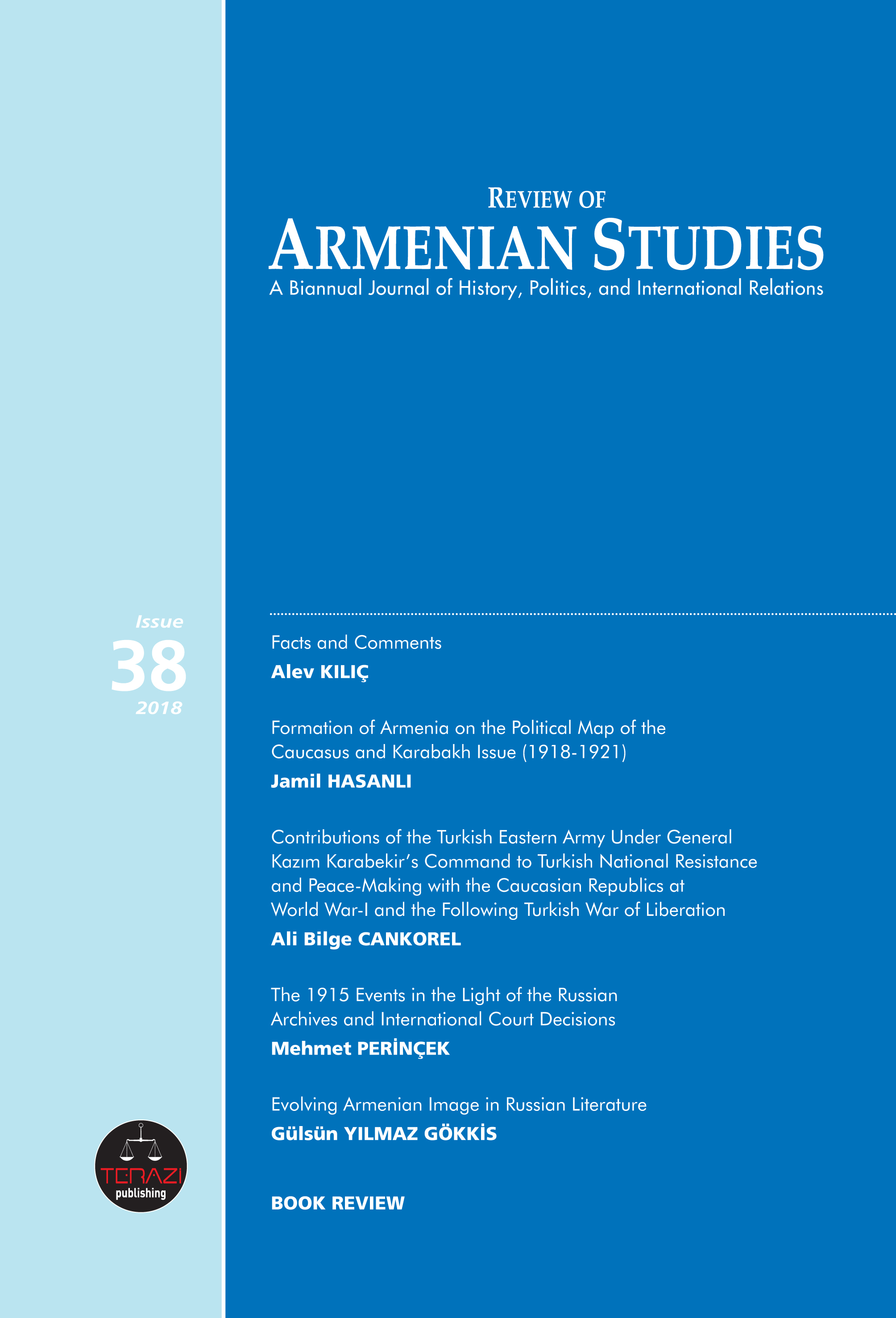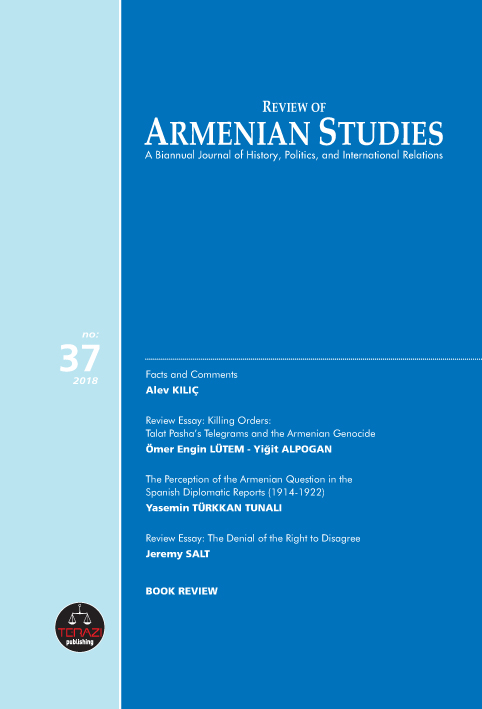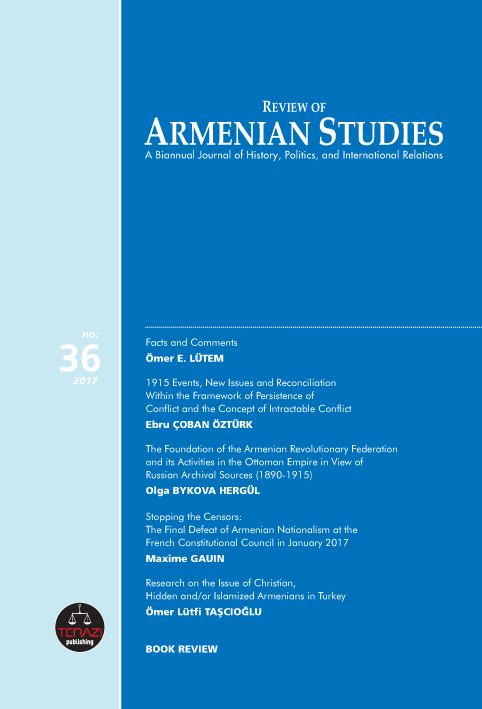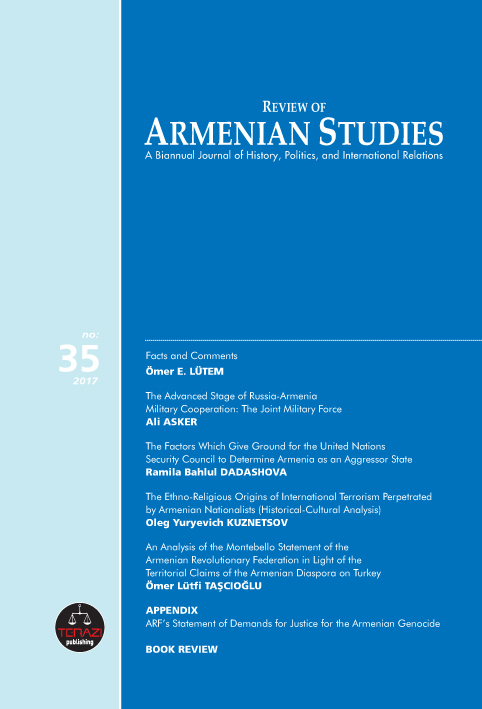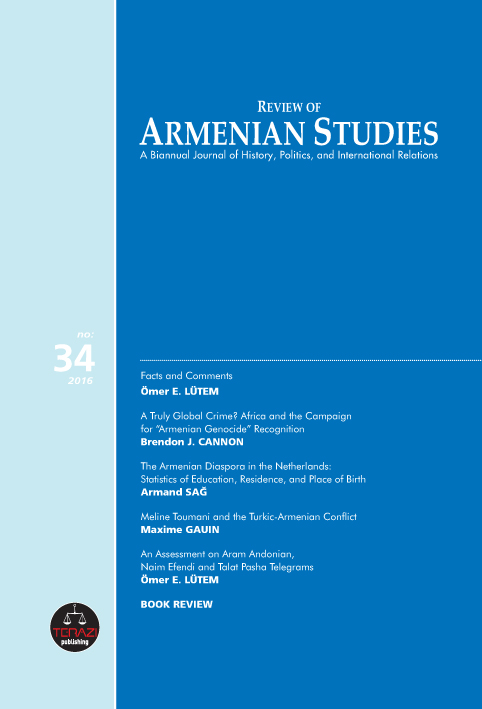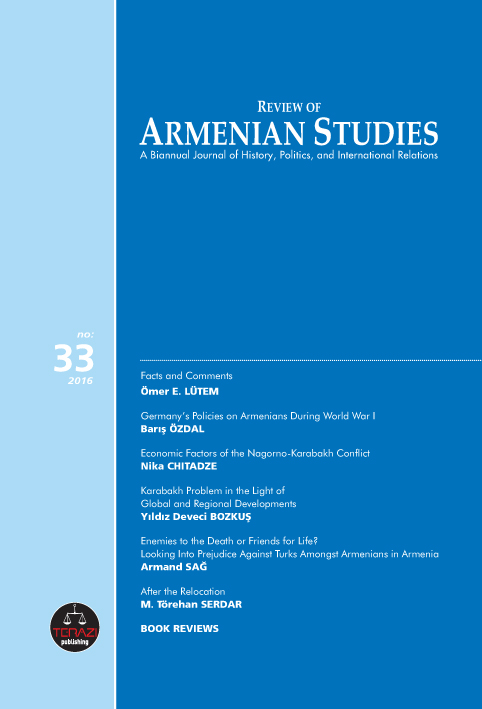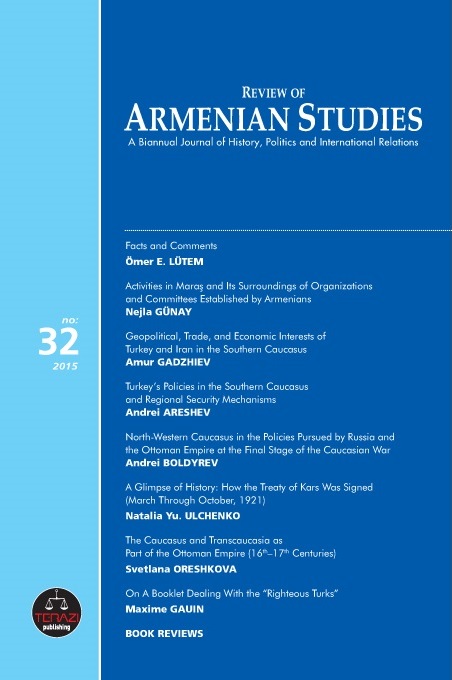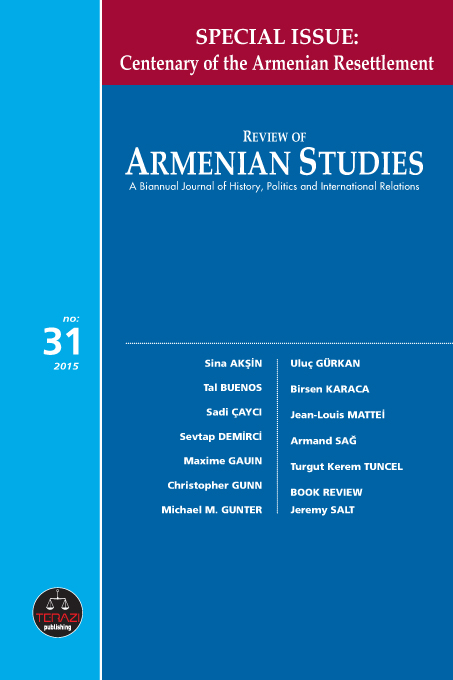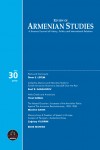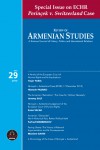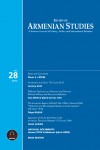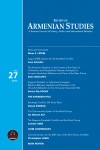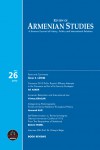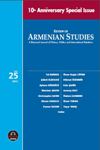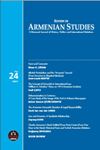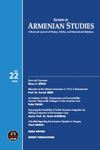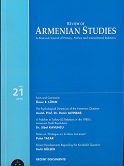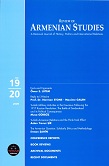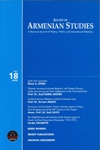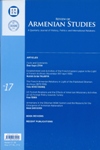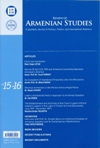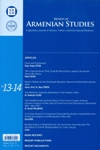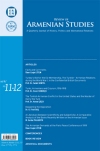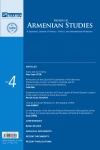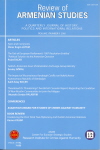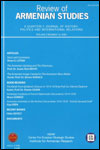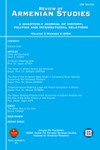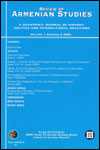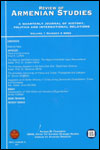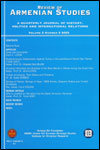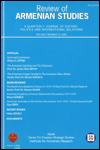The Review of Armenian Studies (RAS) is a biannual academic journal that was established in 2002 with the aim of publishing academic papers to stimulate inter-disciplinary debate between academics and practitioners on topics relating to Armenian Studies. RAS invites paper submissions on any subject related to the journal’s scope of research, which include:
- The Armenian revolts in the 19th and 20th century era of the Ottoman Empire
- Historical, political, and social dimensions of the 1915 events
- Various aspects of the dispute over the 1915 events
- Politics in the Armenian world (in Armenia and in the Armenian Diaspora)
- Culture and society in the Armenian world (in Armenia and in the Armenian Diaspora)
- Bilateral relations of Armenia with other countries
- Regional and international politics of Armenia
RAS is indexed by EBSCO and TÜBİTAK/ULAKBİM.
Review of Armenian Studies çevrimiçi makale gönderme ve hakem değerlendirme sistemine hoş geldiniz.
Makalenizi göndermek için lütfen buraya tıklayın.
Yardım videosu için lütfen buraya tıklayın.
REVIEW OF ARMENIAN STUDIES
Altı Aylık, Tarih, Politika ve Uluslararası İlişkiler Dergisi
ISSN: 1303-5304 eISSN: 2757-5845
BAŞ EDİTÖR: E. Büyükelçi - Ambassador (R) Alev Kılıç [Avrasya İncelemleri Merkezi(AVİM)]
SORUMLU YAZI İŞLERİ MÜDÜRÜ: Dr. Teoman Ertugrul Tulun, M.A. [Avrasya İncelemleri Merkezi (AVİM)]
DANIŞMAN EDİTÖR:
EDİTÖR YARDIMCISI:
İMTİYAZ SAHİBİ: AVRASYA BİR VAKFI (1993)
Bu yayın, Avrasya Bir Vakfı adına, Avrasya İncelemeleri Merkezi tarafından hazırlanmakta ve Terazi yayıncılık tarafından basılmaktadır. / This publication is edited by Center for Eurasian Studies on behalf of Avrasya Bir Vakfı, and published by Terazi publishing.
YAYIN KURULU
Prof. Dr. Seçil KARAL AKGÜN (Orta Doğu Teknik Üniversitesi, E. Öğretim Üyesi)
Yiğit ALPOGAN (E. Büyükelçi)
Ertuğrul APAKAN (E. Büyükelçi)
Prof. Dr. Hüseyin BAĞCI (Orta Doğu Teknik Üniversitesi)
Assist. Prof. Dr. Brendon J. CANNON (Khalifa Üniversitesi)
Ahmet Altay CENGİZER (Büyükelçi)
Prof. Dr. Sadi ÇAYCI (Başkent Üniversitesi)
Prof. Dr. Kemal ÇİÇEK (21. Yüzyıl Türkiye Enstitüsü)
Dr. Şükrü ELEKDAĞ (E. Büyükelçi)
Dr. Edward ERICKSON (Antalya Bilim Üniversitesi)
Uluç GÜRKAN (Gazeteci)
Prof. Dr. Yusuf HALAÇOĞLU (Eski Türk Tarih Kurumu Başkanı)
Prof. Dr. Justin MCCARTHY (Louisville Üniversitesi)
Dr. Jeremy SALT (Bilkent Üniversitesi, E. Öğretim Üyesi)
Prof. Dr. Mehmet SARAY (Tarihçi)
Dr. Bilal N. ŞİMŞİR (E. Büyükelçi, Tarihçi)
Prof. Dr. Refik TURAN (Eski Türk Tarih Kurumu Başkanı)
Prof. Dr. Ömer TURAN (Orta Doğu Teknik Üniversitesi)
Prof. Dr. Hakan YAVUZ (Utah Üniversitesi)
YAYIN SAHİBİ: Terazi Yayıncılık adına - Hazel ÇAĞAN ELBİR
YAYIN İDARE MERKEZİ
Terazi Yayıncılık Bas. Dağ. Dan. Eğt. Org. Mat. Kırt. Ltd. Şti.
Abidin Daver Sokak No. 12/B Daire 4 06550 Çankaya/ANKARA
Tel: 0 (312) 438 50 23 - Faks: 0 (312) 438 50 26
E-posta: teraziyayincilik@gmail.com
YAYIN TÜRÜ: Yerel Süreli Yayın
………………………………………………………………………………………………………..…
ABONE SORUMLUSU
Hülya ÖNALP
Terazi Yayıncılık Bas. Dağ. Dan. Eğt. Org. Mat. Kırt. Ltd. Şti.
Süleyman Nazif Sokak No. 12/B Daire 4 06550 Çankaya/ANKARA
SAYFA DÜZENİ
Ruhi ALAGÖZ
BASKI
Özyurt Matbaacılık
Büyük Sanayi 1. Cad. Süzgün Sok. No: 7 İskitler / ANKARA
Tel: +90 312 384 15 36 Faks: +90 312 384 15 37
Makaleyi göndermeden önce Yazarlara Bilgi’yi lütfen okuyun ve aşağıdakilerin eksik olmadığından emin olun:
- Editöre mektup
- Makalenin türü
- Başka bir dergiye gönderilmemiş olduğu bilgisi
- Sponsor veya ticari bir firma ile ilişkisi (varsa belirtiniz)
- Kaynakların Chicago 17 – Citation Guide’a göre belirtildiği
- İngilizce/Türkçe yönünden kontrolünün yapıldığı
- Yazarlara Bilgide detaylı olarak anlatılan dergi politikalarının gözden geçirildiği
- Telif Hakkı Anlaşması Formu
- Daha önce basılmış material (yazı-resim-tablo) kullanılmış ise izin belgesi
Makale Kapak Sayfası
- Makalenin kategorisi
- Makalenin Türkçe ve İngilizce başlığı
- Yazarların ismi soyadı, unvanları ve bağlı oldukları kurumlar (üniversite ve fakülte bilgisinden sonar şehir ve ülke bilgisi de yer almalıdır), e-posta adresleri
- Sorumlu yazarın e-posta adresi, açık yazışma adresi, iş telefonu, GSM, faks nosu
- Tüm yazarların ORCID’leri
Makalenin ana metni
- Makalenin Türkçe ve İngilizce başlığı
- Özetler 180-300 kelime Türkçe ve 180-300 kelime İngilizce
- Anahtar Kelimeler: 3-5 arası Türkçe ve 3-5 arası İngilizce
- Makale ana metin bölümleri
- Teşekkür (varsa belirtiniz)
- Kaynaklar
- Tablolar-Resimler, Şekiller (başlık, tanım ve alt yazılarıyla)
Makale Gönderme
Makalenin gönderileceği DergiPark sayfası adresi: https://dergipark.org.tr/en/journal/2308/submission/step/manuscript/new
Yapılan başvurularda, çalışmanın sorumlu yazarının (corresponding author) hesabı kullanılmalıdır. Sorumlu yazarın dışındaki yazarların ya da çalışmada yazar olarak yer almayan bir başkasının hesabı kullanılmamalıdır. Başvuru ile ilgili bütün yazışmalar DergiPark sistemi üzerinden gönderilen elektronik posta ile sorumlu yazara iletilmektedir.
Makale ana metninin dosyasını (Main Document) yüklerken, çift taraflı kör hakem süreci gereği, bu dosyanın yazar kimliğini deşifre eden hiçbir unsur barındırmadığından emin olun. Makale ana metni dosyası (Main Document) başlık sayfasını (Title Page) içermemeli; yazar adı geçen ya da yazar adlarını ifşa edebilecek bölümler içermemeli (Örneğin: Teşekkür, her sayfada tekrar eden ve yazar adlarını içerebilen başlık).
Ayrı Ayrı Yüklemeniz gereken dosyalar
- Telif Hakkı Anlaşması Formu
- Resim, Tablo vb başka kaynaktan alındıysa izin belgesi
- Makale Kapak Sayfası
- Makale Ana Metni Dosyası (Bu dosya aşağıdaki unsurları içermelidir)
- Makalenin Türkçe ve İngilizce başlığı
- Özetler 150-300 kelime Türkçe ve 150-300 kelime İngilizce
- Anahtar Kelimeler: 3-5 arası Türkçe ve 3-5 arası İngilizce
- Makale ana metin bölümleri
- Teşekkür (varsa belirtiniz)
- Kaynaklar
- Tablolar-Resimler, Şekiller (başlık, tanım ve alt yazılarıyla)
Please click here to access the COPYRIGHT FORM
Articles submitted for publication are subject to peer review. The journal’s language is English. Review of Armenian Studies (RAS) accepts academic research that has not been previously submitted to another journal for publication. Submissions must be written in accordance with the standards put forward by the journal, and with a clear and concise language. The journal uses the latest edition of Chicago Manual of Style (full note) as its citation style. Please refer to Chicago Manual of Style official website for further details regarding proper citation methods (www.chicagomanualofstyle.org). RAS recommends the use of automated citation platforms such as “Zotero” or “Citation Machine” to make citation faster and easier for the authors.
Please submit manuscripts via e-mail to Managing Editor Mehmet Oğuzhan Tulun via motulun@avim.org.tr.
RAS welcomes the submission of manuscripts as articles and book reviews.
Articles should range from 6,000 to 18,000 words and should be approximately 10-30 single-spaced pages in length (including footnotes and bibliography). Articles must be word processed using Microsoft Word, 12-point font, Times New Roman, and should be single-spaced throughout allowing good (1-1/2 inch) margins. Pages should be numbered sequentially. There should be a clear hierarchy of headings and subheadings. Quotations with more than 40 words should be indented from the left margin.
The title page of the article should include the following information:
- Article title
- Names, affiliations, and ORCID iDs of all contributing authors
- Full address for correspondence, including telephone and email address
- Abstract: please provide a short summary of up to 300 words.
- Keywords: please provide 5 key words, suitable for indexing. Ideally, these words will not have appeared in the title
Book reviews should range from 1,200 to 2,400 words and should be approximately 2-4 single-spaced pages in length (including footnotes), and should be on recently published books on related subjects. Book reviews must be word processed using Microsoft Word, 12-point font, Times New Roman, and should be single-spaced throughout allowing good (1-1/2 inch) margins. Pages should be numbered sequentially. Page numbers regarding the book under review should be given in parentheses within the text, other citations should be given in the footnote section.
Book reviews should have a title and the name(s), affiliation(s), and ORCID iD(s) of the reviewer(s) should be included. The details of the book under review should be listed with the following details:
- Name(s) of the author(s) or editor(s) of the book under review
- Title of book
- Year of publication
- Place of publication
- Publisher
- Number of pages
- Language of the book
- Price (please indicate paperback or hard cover) if available
The editorial office will make every effort to deal with submissions to the journal as quickly as possible. All papers will be acknowledged on receipt by email.
For your questions, please contact Managing Editor Mehmet Oğuzhan Tulun at motulun@avim.org.tr
Editörlük Birimi Biçimsel Uygunluk Değerlendirmesi: Dergimiz dergipark sistemi üzerinden iletilen her yazıya öncelikle bir kod verilerek Editörlük Birimi tarafından dergimiz Yayın İlkeleri çerçevesinde değerlendirilir (makale, öz ve anahtar kelimelerin sayısı, kaynakça kuralları vb.). Bu aşamada, Editörlük Birimimiz yalnızca yazının Yayın İlkeleri’ne biçimsel uygunluğunu sağlamaya çalışır, içerikle ilgili herhangi bir değerlendirme yapmaz.
Yayın Kurulu Değerlendirmesi ve Hakemlerin Belirlenmesi: Editörlük Birimi tarafından biçimsel uygunluğu değerlendirilen ve olumlu görüş bildirilen her yazı, yazarın kimliğini belli edecek ifadelerin gizlenmesi yoluyla “anonimleştirilerek” Yayın Kurulu üyelerine gönderilir. Editör, Editör Yardımcıları ile farklı üniversitelerden ve disiplinlerden akademisyenlerden oluşan Yayın Kurulu, çevrimiçi veya yüz yüze toplantı şeklinde yılda iki kez toplanır. Toplantıda yazılar “Kör Yayın Kurulu” ilkesine göre ele alınır. Yayın Kurulunda ele alınan yazılar hakkında “hakemlere gönderme”, “yeniden düzenleme” veya “ret” şeklinde karar verilir.
Hakem Değerlendirmesi: Makaleler, Yayın Kurulunca ön incelemeden geçirilmekte ve uygun bulunanlar iki ayrı hakeme gönderilmektedir. İki hakemin görüş ayrılığı durumunda, üçüncü bir hakemin görüşüne müracaat edilmektedir. Hakemlerden gelen raporlar doğrultusunda, makalenin basılmasına, yazardan raporlar çerçevesinde düzeltme istenmesine ya da geri çevrilmesine karar verilmektedir. Gönderilen makalelerin en az iki hakemin olumlu değerlendirmesinden sonra yayımlanıp yayımlanmayacağına ve Derginin hangi sayısında yayımlanacağına Yayın Kurulu karar vermektedir. “Kör Hakemlik” ilkesi nedeniyle hakemlerle yazar arasındaki iletişim, Editörlük Birimi aracılığıyla dergipark sistemi üzerinden yürütülür. Yazıların 60 gün içinde hakemlik sürecini tamamlaması ve yayımlanması öngörülmektedir.
Son aşamada makale, en az iki hakemin “yayımlanabilir” raporu doğrultusunda editör kurulu tarafından bilime ve alana katkısı, derginin yayın politikasına ve önceliklerine uygunluğu açısından değerlendirilir ve yayım sırasına alınıp alınmamasına karar verilir.
The following are the stages of the publication process :
1. The average time during which the preliminary assessment of manuscripts is conducted carried out by the editorial team : 10 days.
2. The average time during which the manuscripts double blind review is conducted : 40 days.
3. After going through the review process, if required, the authors are given the opportunity to improve. After the corrections have been made by the authors, the editorial team will re-examine the improvements made by the author with the input provided by the reviewers. This is done until the authors make improvements in accordance with the input provided by the reviewers.
4. The average time in which the article is published: 10 days (Online First Publication)
5. Each Article is Psychically published in June and December.
Hakem olmak için istek gönderin
Açıklama: RAS, genel bir hakem listesini Web Sayfasında duyurmaktadır. Veri Koruma mevzuatı uyarınca, adınızın yayınlanmasını istemiyorsanız lütfen bize bildirin (e-posta ile kısa bir "açıklamama" ifadesi ile göndermeniz yeterlidir.: submissions@ustich.org
Hakem Listesi
Review of Armenian Studies (RAS) (ISSN: 1303-5304 eISSN: 2757-5845) :
| Year |
| Year | |||||||||
| Year |
Açıklama: RAS, genel bir hakem listesini Web Sayfasında duyurmaktadır. Veri Koruma mevzuatı uyarınca, adınızın yayınlanmasını istemiyorsanız lütfen bize bildirin (e-posta ile kısa bir "açıklamama" ifadesi ile göndermeniz yeterlidir.: submissions@ustich.org
Hakemlerin Etik Sorumlulukları
Tüm çalışmaların "Körleme Hakemlik" ile değerlendirilmesi yayın kalitesini doğrudan etkilemektedir. Bu süreç yayının nesnel ve bağımsız değerlendirilmesi ile güven sağlar. RAS değerlendirme süreci çift taraflı kör hakemlik ilkesiyle yürütülür. Hakemler yazarlar ile doğrudan iletişime geçemez, değerlendirme ve yorumlar dergi yönetim sistemi aracılığıyla iletilir. Bu süreçte değerlendirme formları ve tam metinler üzerindeki hakem yorumları editör aracılığıyla yazar(lar)a iletilir. Bu bağlamda RAS için çalışma değerlendiren hakemlerin belirtilen etik sorumluluklara sahip olması beklenmektedir.
Please click here to access the ETHICAL CONSENT FORM
International Committee of Medical Journal Editors’ (ICMJE) recommendations and Committee on Publication Ethics’ (COPE) International Standards for Editors and Authors will be used in the evaluation of the manuscripts sent to the Review of Armenian Studies (RAS) journal.
Ethical Tasks and Responsibilities of Authors and Co-authors
1. Studies that require ethics committee decisions;
1.1.1. For research conducted in all scientific fields and for the clinical and experimental cases below on people and animals which require ethics committee decisions;
1.1.2. All kinds of research that are conducted with qualitative or quantitative approaches which require gathering data from participants using questionnaires, interviews, focus group work, observation, experiments, discussion/negotiation techniques
1.1.3. Use of humans and animals (including material/data) for experimental or other scientific purposes,
1.2.1. Clinical studies conducted on humans,
1.2.2. Research conducted on animals,
1.2.3. Retrospective studies in conformity with the law on the protection of personal data, ethics committee approval must be acquired separately, this approval must be indicated in the manuscript and documented.
1.3. Information regarding permission/authorization (committee name, date, and issue no/number) must be included in the manuscript’s “Method” section and additionally in the first/last page.
1.4. During the manuscript upload, the Ethics Committee Approval file must also be uploaded to the system in addition to the manuscript file.
1.5. Moreover, in case reports, information that the informed voluntary confirmation/consent form was signed must be included in the manuscript.
2. It must be indicated in the manuscript whether obtaining legal/exclusive permission is required. If the study contains a practice conducted in an institution, it must be clearly indicated on which date and which decision or issue number the permission was obtained from the relevant institution.
3. For the use of scales, questionnaires, photographs belonging to others, it is necessary that permission is obtained from the owners and that this is indicated in the article through providing the relevant references.
4. It must be stated that intellectual property rights regulations are complied with for the ideas and works of art used in the manuscript.
5. All contributing resources of the study must be stated in the acknowledgement section of the manuscript.
6. The authors of the manuscript submitted to RAS must certify that their manuscript is original and use citation methods for the citations made in their manuscript in accordance with ethical principles.
7. All authors are responsible for all sections of the manuscript.
8. Authors must clearly state any kind of conflict of interest or overlap of interest in their manuscript. In cases where there is no conflict of interest or overlap of interest regarding the subject of the manuscript, this statement must nevertheless be present in the manuscript. The most common types of conflict of interest are financial support, education, or other funding types, personal or institutional relations and memberships.
9. The submitted manuscript must not have been previously submitted to any other journal. It may be submitted to another journal for evaluation when the process is complete in a journal and the relevant manuscript is rejected. Simultaneously submitting the same manuscript to more than one journal constitutes unethical publishing behavior. Moreover, the authors’ manuscript must not been previously published elsewhere.
10. When an author encounters an important error or misstatement or inaccuracy in his/her published work, s/he is responsible for immediately informing the journal editor or publisher of this case and cooperating with the editor to withdraw or correct the manuscript.
11. Researchers who have made significant contribution to the concept, design, performance, data collection and/or analyses in a study, researchers who have participated in the preparation of the manuscript or in its critical revision, and researchers who have approved of the final state of the manuscript and approved its submission must be included into the study as responsible authors. Apart from this, authors who have made other contributions (for instance: technical support, facilitators in writing and editing, general contributions etc.) must not be included to the authors list. However, the contributions by these people must be stated in the acknowledgement section.
12. In the case of a need for processes such as adding an author, changing the author order, removing an author for a manuscript for which the evaluation process has started, an application may be made to the RAS Editorial - Advisory Board with the approval of all the authors. The Editorial - Advisory Board will decide on the application and inform the author responsible of the decision.
Ethical Tasks and Responsibilities of the Editor
1. The editor must come to a decision on the manuscript according to its original value, the objectives of RAS, and ethical rules.
2. The editor should only put manuscripts with high original value, and which adhere to RAS objectives and ethical rules into the evaluation process.
3. So long as there is no significant reason, the editor and field editors must pay regard to the positive views of the reviewer/referee.
4. The requests and views from the authors must be replied to through feedback.
5. Referees must be selected in accordance with the manuscript’s subject.
6. Attention must be paid to preventing conflict of interest and self-interest relationships between the referees and the authors.
7. The editor is responsible for guiding the referees during the manuscript evaluation process and providing the requested information.
8. The editor is responsible for hiding the credentials of the author and referee based on the double-blind review practice.
9. The necessary warnings must be made and measures must be taken so that the referees evaluate the manuscript in a timely, objective, and scientific manner.
10. Effort must be made to increase the number of referees.
11. The editor must pay regard to the opinions and recommendations of the Editorial - Advisory Board regarding the manuscript.
12. The editor’s decisions regarding the manuscript must be independent from the owner and publisher of RAS.
13. The editor is responsible for paying regard to RAS’ publication guidelines, objectives, and international standards regarding the manuscripts of that will be published.
14. The editor is responsible for not conveying the personal information of the manuscript authors to third parties outside of the authors’ consent.
15. The editor is responsible for the protection of human and animal rights in the case of studies being conducted on humans and animals present in the contents of the manuscrpit. The editor is responsible for declining a manuscript in the case of an ethics committee approval not being sent for studies in which an ethics committee report is required.
16. The editor is responsible for protecting the intellectual property rights of all manuscripts that were submitted to and published by RAS.
17. The editor is responsible for providing clear and illuminating responses to the complaints from referees, authors, and readers.
18. The editor is responsible for taking precautions against conflict of interest and self-interest relationships that may occur between authors, referees, and third parties for the completion of the evaluation processes in an objective and autonomous manner.
19. The editor is responsible for the consideration of the feedback from readers, researchers, and implementers regarding the published studies and making the necessary responses and applying the necessary procedures.
Ethical Responsibilities of the Referees
1. Referees are responsible for not evaluating the manuscript in the case of conflict of interest and self-interest relationships.
2. Referees are responsible for the evaluation of the manuscript by paying attention to the guidelines of confidentiality and objectivity.
3. Referees cannot use the manuscript delivered to them for any purpose until the evaluation process is complete and the manuscript is sent for publication.
4. While evaluating the manuscript, referees are responsible for not allowing the authors’ gender, nationality, religious beliefs, or political views to influence the evaluation.
5. Referees must use polite and constructive language while reviewing the manuscript. Comments and statements containing insults, slander, and enmity must be avoided.
6. Referees are responsible for reviewing the manuscript in a timely manner and in accordance with the ethical rules.
TR Index Criteria
Under the ethical rules title, the aspects below should also be abided (please click here to access the full list of the criteria for the TR Index Application and Evaluation Processes)
1. Ethics committee approvals must be separately acquired for research conducted in all scientific fields including social sciences and for clinical and experimental studies on humans and animals which require an ethics committee decision, this approval must be indicated in the manuscript and documented.
2. Under this title, under separate titles for referees, authors and editors, information must be provided regarding the ethical rules.
3. A statement of accordance with the Research and Publication Ethics must be included in the manuscripts.
4. Ethical principles must be stated in the journal and/or the website under separate titles while referring to national and international standards. For instance; in scientific articles submitted to journals, ICMJE’s recommendations and COPE’s International Standards for Editors and Authors must be paid attention to.
5. In studies that require ethics committee permission/authorization, information regarding the permission (committee name, date, and issue number) must be included in the method section and additionally in the first/last page. In case reports, information that the informed voluntary confirmation/consent form was signed must be included in the manuscript.
6. The copyright regulations for the ideas and works of art used must be abided.
7. At the end of the manuscript; the researchers’ statement of contribution ratio, statement of support, and appreciation if available, and conflict statement must be included.
Note: Retrospective ethics committee permission is not required for manuscripts that have used research data from before 2020, prepared from postgraduate/doctorate studies (must be indicated in the manuscript), applied for publication in the journal the previous year, were approved but not yet published. Please indicate in the declaration form that your study constitutes this case.
ABONE SORUMLUSU
Hülya ÖNALP
Terazi Yayıncılık Bas. Dağ. Dan. Eğt. Org. Mat. Kırt. Ltd. Şti.
Address: Süleyman Nazif Sok. 12/B No:3-4, Güzeltepe, Çankaya, Ankara, Turkey
Tel: +90 312 438 50 23
Fax: +90 312 438 50 26
Email: honalp@avim.org.tr
YILLIK ABONELİK ÜCRETİ (NAKLİYAT DAHİL)
Yurtiçi: 90 TL
Yurtdışı: 30 USD
Yazarlar, Uluslararası Suçlar ve Tarih’te (UST) yayımlanan çalışmalarının telif hakkını ellerinde tutarlar. Yazarlar, çalışmanın UST’de yayımlanmasıyla birlikte dergiye, eseri yayımlama, çoğaltma, dağıtma, arşivleme ve açık erişim ortamında kamuya sunma konusunda münhasır olmayan (non‑exclusive) bir yayın lisansı verirler. Çalışmalar, Creative Commons Atıf-GayriTicari 4.0 Uluslararası (CC BY-NC 4.0) lisansı (https://creativecommons.org/licenses/by-nc/4.0/deed.tr) altında lisanslanır. CC BY-NC 4.0 lisansı, eserin ticari kullanım dışında her boyut ve formatta paylaşılmasına, kopyalanmasına, çoğaltılmasına ve orijinal esere uygun şekilde atıfta bulunmak kaydıyla yeniden düzenleme, dönüştürme ve eserin üzerine inşa etme dâhil adapte edilmesine izin verir.
Yayınlanmak üzere Uluslararası Suçlar ve Tarih’e (UST) gönderilen çalışmalar, daha önce herhangi bir şekilde yayımlanmamış veya herhangi bir yere yayımlanmak üzere gönderilmemiş, özgün nitelikte olmalıdır. UST’ye çalışma gönderecek yazarlar “Telif Hakkı Formu” belgesini doldurmalıdır. Yazar(lar) doldurdukları formu ıslak imza ile imzalamalıdır. İmzalanan form taranarak DergiPark sistemi üzerinden yüklenmelidir. Telif Hakkı Formu’nu iletmeyen yazarların çalışmaları yayımlanmaz.
Review of Armenian Studies (RAS), kamuoyunda serbestçe araştırma yapmanın daha büyük bir küresel bilgi alışverişini desteklediği ilkesine dayanarak içeriğini anında açık erişim sunar. Derginin yayınlarında ambargo uygulanmaz. Gönderi ve kabul tarihleri, yayın tarihleriyle birlikte, her makale için PDF dosyada üzerinde verilir.
RAS, Budapeşte Açık Erişim Girişimi’nin açık erişim tanımı çerçevesinde ve bilimsel etik ve kurallara uygun olarak atıf yapılması şartıyla, dergide yayınlanan hakem değerlendirmesinden geçmiş bilimsel literatürün, internet aracılığıyla; finansal, yasal ve teknik engeller olmaksızın, serbestçe erişilebilmesini, okunabilmesini, indirilebilmesini, kopyalanabilmesini, dağıtılabilmesini, basılabilmesini, taranabilmesini, tam metinlere bağlantı verilebilmesini, dizinlenebilmesini, yazılıma veri olarak aktarılabilmesini ve her türlü yasal amaç için kullanılabilmesini kabul eder.
Yayınlanan makalelerin yazarları telif hakkı sahibi olarak kalır ve üçüncü taraflara, makaleyi Creative Commons lisans sözleşmesine göre kullanma, çoğaltma ve paylaşma hakkı verir.
Yazarların makalelerini kurumsal arşivlerde depolamalarını teşvik eder.
ETİK KURUL İZNİ GEREKTİRMEDİĞİNE DAİR BEYAN FORMU
YAYIN ETİĞİ VE ETİK KURUL İZİN BELGESİ BEYAN FORMU (Bağımsız araştırmacı)
Erken Görünüm Listesi:
| DOI | MAKALE TÜRÜ | YAZAR | BAŞLIK | KABUL TARİHİ |
Erken Görünüm Hakkında:
Erken Görünüm Nedir?
Erken Görünüm, Uluslararası Suçlar ve Tarih (UST) dergisinin basıma hazır makaleleri, baskıdan önce online olarak yayımladığı ortamdır. Erken Görünüm olarak yayımlanan bir makaleye cilt, sayı bilgileri atanmamakta, makale DOI (Digital Object Identifiers) numarası ile yayımlanmaktadır.
Makale yayın kurulunun belirlediği ilgili sayıda yayımlandığında Erken Görünüm sayfasından kaldırılmakta ve web sitesinde, yayımlandığı sayı içerisine alınmaktadır. Hakem sürecini olumlu tamamlayan bir çalışma yaklaşık 30 gün içerisinde Erken Görünüm olarak yayınlanmaktadır.
Erken Görünüm Olarak Yayımlanan Makalelere Atıf Nasıl Yapılır?
Erken Görünüm olarak yayınlanan bir çalışmanın Chicago 17 – Citation Guide’a uygun gösterimi aşağıdaki örnekte yer almaktadır.
Koçak, Sinan. “An Examination on the Demographic Structure of Armenians in Tbilisi (1897-2014).” Review of Armenian Studies, no. 47 (July 22, 2023): 63–95.
Erken Görünümün Amaç ve Faydaları Nelerdir?
Erken Görünüm yayınlanan makaleler, geleneksel yöntemin aksine, yayınlanacağı sayıyı beklemeyeceği için, okuyucu ve araştırıcılara daha hızlı ve erken ulaşmış olacaktır. Yani Erken Görünüm ile hakemlik süreci ve dizgisi tamamlanmış makaleler, diğer makalelerin süreçleri devam ederken ulaşılabilir hale getirilir. Böylece araştırmacılar ve okuyucular en yeni araştırmalara ve çalışmalara daha hızlı ulaşabilirlerken, yazarlar ise sonuçlarını daha hızlı bir şekilde sunabilirler. Bu da dergiye ve çalışmaya daha fazla indirme ve atıf imkânı sağlayabilir.
Erken Görünüm Makalelerde Nasıl Değişiklik Yapılır?
Erken Görünüm olarak yayımlanan makaleler basılan hâli ile aynıdır. Sadece cilt, sayı ve sayfa numarası atanır. Dolayısıyla OnlineFirst olarak yayımlandıktan sonra bir makalede değişiklik yapılmamalıdır. Sadece basılan nüsha ile Erken Görünüm arasında erratum (yazım/dizgi hatası) uygulamasını gerektirecek belirgin bir hatanın olması durumunda değişiklik yapılmalıdır.
Erken Görünüm Makalelerde Değişiklik Yapmak
Erken Görünüm olarak yayımlanan makaleler basılan hâli ile aynıdır. Sadece cilt, sayı ve sayfa numarası atanır. Dolayısıyla Erken Görünüm olarak yayımlandıktan sonra bir makalede değişiklik yapılmamalıdır. Sadece basılan nüsha ile Erken Görünüm arasında erratum uygulamasını gerektirecek belirgin bir hatanın olması durumunda değişiklik yapılmalıdır.
Atıf Veritabanları :
.png) TR Dizin Kabul Tarihi: 01/01/2012
TR Dizin Kabul Tarihi: 01/01/2012
.png) Sobiad Kabul Tarihi: 01/09/2024
Sobiad Kabul Tarihi: 01/09/2024
Çok Disiplinli Veritabanları:
Uzmanlaşmış Veritabanları:
Analiz Ve Kimlik Veritabanları:
 MIAR : University of Barcelona Kabul Tarihi: 23/12/2022
MIAR : University of Barcelona Kabul Tarihi: 23/12/2022
Dergi Sıralama Listeleri:
Kaynakçasal Veritabanları :
Dergi Dizinleri:
 Erih Plus Accepted: 25.06.2024
Erih Plus Accepted: 25.06.2024
İçerik Toplayıcılar :
Dijital Muhafaza :
SORUMLU YAZI İŞLERİ MÜDÜRÜ
Sorumlu Yazı İşleri Müdür
Dr. Teoman Ertuğrul Tulun
Tel: +90 312 4385023
Faks: +90 312 438 50 26
email: editor@ustich.org



